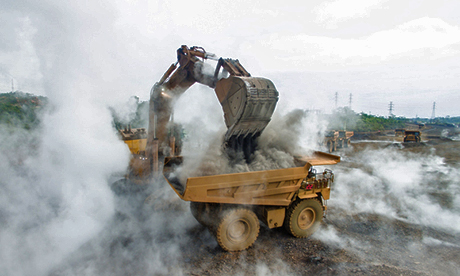Human rights abuses and environmental violations have been uncovered in the Philippines and Indonesian nickel supply chains, a major component of electric vehicle (EV) batteries.
A report released by the London-based Business & Human Rights Resource Centre (BHRRC) revealed that these supply chains provide batteries to major companies such as Panasonic, Tesla and Toyota.
The lack of transparency in EV battery supply chains allows end-user companies to distance themselves from lower-level abuses and evade responsibility for associated risks, according to the BHRRC’s report titled “Powering Electric Vehicles.”
The BHRRC identified the Rio Tuba Nickel Mining Corporation (Rio Tuba) in the Philippines, as well as Zhejiang Huayou Cobalt (ZHC) and CNGR Advanced Materials (CNGR), two Chinese companies operating in Indonesia, as responsible for the “rising incidents of human and environmental rights violations.”
“The human rights abuses in electric vehicle supply chains need to be urgently interrogated and mitigated … and supply chain transparency and accountability must be at the heart of this,” said Pochoy Labog, the BHRRC’s Southeast Asia researcher.
The mining operations of these companies have had detrimental effects on local communities, including the loss of food security, destruction of rainforests, water contamination, harm to marine life and health-related problems such as respiratory issues.
Additionally, the BHRRC stated that the companies failed to obtain free, prior consent from indigenous communities before mining their lands.
Negative consequences of mining are evident
The mining and processing companies involved in these supply chains have refuted the claims made by the BHRRC, stating that their activities do not significantly impact the environment and that their own investigations have not found any rights violations.
However, the report highlights the negative consequences of these mining operations in various regions.
In Central Sulawesi, Indonesia, forests are being destroyed, mine tailings have contaminated rivers and streams, and coral reefs are being affected by the contaminated waters.
In Palawan, the Philippines, Rio Tuba’s mining operations have led to water contamination, loss of food security and the destruction of rainforests.
Locals have reported health issues such as coughs and respiratory diseases, prompting water quality tests that revealed the presence of hexavalent chromium, a human carcinogen, in river water samples.
Greenpeace Philippines country director Lea Guerrero said mining is unsustainable since “extractive activity itself is highly destructive.”
“We need to change how we use materials as a society,” she told BenarNews. “Many mining concessions are located in islands where many biodiversity and ecosystems are destroyed just to extract minerals.”
Indonesia, the world’s largest producer of nickel, with 21 million metric tons (4.6 billion pounds) in proven reserves, and the Philippines, ranking fifth in reserves but second in nickel production with 330,000 metric tons (728 million pounds) in 2022, play crucial roles in the global nickel market.
“As the globe transitions to these cleaner sources of energy, companies must recognise their role in mitigating the endemic human rights issues in EV battery supply chains – and must use their leverage to hold suppliers accountable for risks in their value chains,” BHRRC said.
